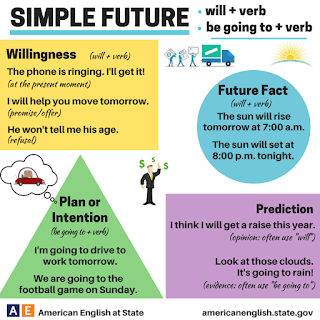WE LEVEL 01
REVIEW
CEVAZ
A) Complete the sentences with
the verb To Be - affirmative:
Ex.: Robert is a teacher
1.
She_____ a student.
2. We______
teachers.
3. It
_____ a cat.
4.
They _______ dogs.
5.
John ______ a boy.
6.
Fatima ____ Portuguese.
7.
Tom and Peter _____ friends.
B) Complete the sentences with
the verb To Be – negative. Write full and contracted forms:
Ex.: Peter is not a lawyer/
Peter isn’t a lawyer
1.
She _____________ a boy.
2. I _____________
a doctor.
3.
You ____________ a dentist.
4. Paul
and Rodrigo ______________ English.
5.
Those _____________ pencils.
6. It
______________ a book.
7.
Michael _____________ a nurse.
C) Complete the questions with
the correct form of the verb To Be.
Ex.: Is she an architect?
1.
_______ you from Indonesia?
2.
_______this your car?
3.
_______ we at the right place?
4.
_______ I in the right classroom?
5.
_______ she tall?
D) Complete the sentences with
the correct Possessive Adjective:
My Your His Her Its Our Their
1) He
is __________ brother.
a. you
b. your
2) Those
are __________ bananas.
a. they
b. their
3) She
is __________ new teacher.
a. I
b. my
4) Mr.
Johnson’s __________ father.
a. our
b. we
5) These
people are __________ friends.
a. he
b. his
6) Fluffy
is __________ small cat.
a. she
b. her
E) Complete the conversation.
Mary:
Hello. My _______ Mary. What's _______ name?
Peter:
Peter. How _______ you?
Mary:
I'm _______ and you?
Peter:
I’m OK, ________ you from?
Mary:
________ from Ireland.
F) Complete the sentences with
the correct indefinite article “a” or “an”.
1. I
have ____big shirt.
2. She has ____ orange ribbon.
3. I'm
_____ Swedish girl.
4. He
is _____ English boy.
5. What ____ old man!
G) Write the numbers in words.
12________________ 15________________ 88______________
30________________ 95________________ 33______________
8_________________ 13________________ 56______________
H) Complete the sentences with
the correct form of “There is” or “There are”:
1.
__________five pens in the box.
2.
__________a car in the garage.
4.
__________a telephone in the bedroom.
5.
__________two tables in the kitchen.
7.
__________a magazine on the floor.
I) Write the plural next to
each sentence.
For example:
This car is new. These
cars are new.
That girl goes to my school. Those girls go to my school.
1. This
orange is very nice. ________________________
2. That
student writes well. _______________________
3. That
house is near the beach. ___________________
4. This
book belongs to George. ___________________
J) Complete the sentences with
the correct form of the verb To Have: Has
or Have.
1. We
______ beautiful flowers in our garden.
2. Jane
_____ five new English books.
3. I ______
an expensive sport car.
4.
Does Mary _______ a big apartment on the beach?
5. My
sister doesn’t _______ a lot of dolls in her room.
K) Look at the picture and
complete the sentences with prepositions of place:
in on under next
to between
There
is a chair _______ the bed. There are
pictures _____ the wall.
There
is a bed _____ the bedroom. There is a
clothes rack _____ the picture.
There
is a jar and a glass of water _____ the night table _________ the chair.
The
night table is _________ the two chairs.
L) Read the following paragraph.
My
name is John Smith. I am 45 years old. I’m an architect and I work for a
construction company. I’m married to a beautiful woman named Caroline. She is
37 years old. We have two children, Jimmy and Susie. Jimmy is 10 years old and
Susie is 6.
Jimmy
has black hair and dark blue eyes. Susie has light brown hair and brown eyes.
We
live in a nice apartment. It’s small but comfortable.
Now complete the following
paragraph:
____
name _____ Robert Johnson. I ____ 50 years _____. I’m ____ lawyer and I work
for ____ law firm. I ____ divorced and I ______ two children. I ______ dark
brown hair and dark green eyes. I live in ____ small studio apartment. _____ children’s
names are Paul and Daniel. Paul ____ 18 _____ old. He _____ black hair and
brown eye.
Daniel
____ 12 years ____. He ______ dark green eyes and dark brown hair.
I
live _____ a small studio apartment. _____ is very comfortable.





















































